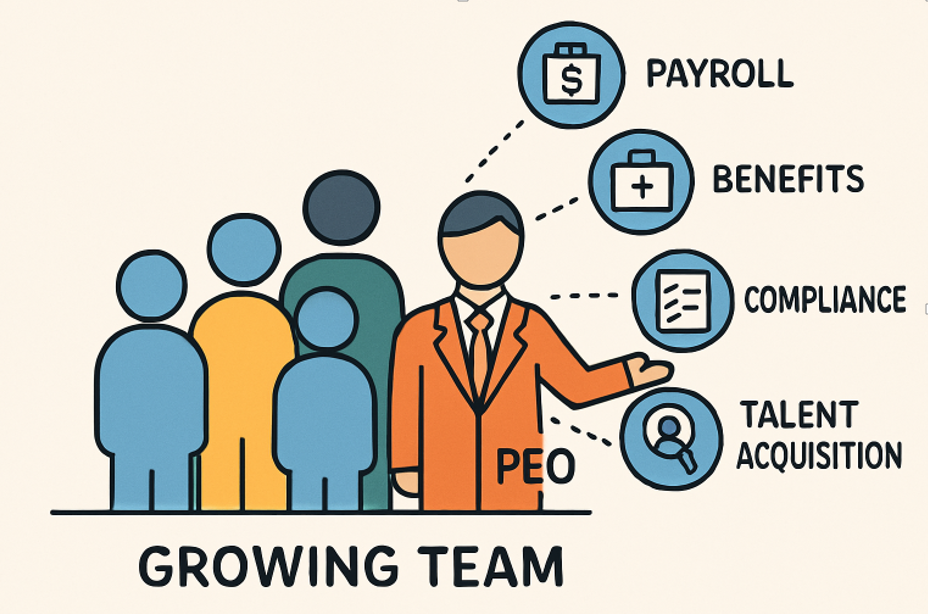How PEOs Fuel Business Expansion for Growing Teams
In today’s fast-moving business world, leaders are realizing that success isn’t just about product innovation or market expansion. It is also about building strong, scalable people strategies. As companies grow, HR responsibilities become increasingly complex, encompassing payroll and compliance, as well as offering competitive benefits that attract top talent. This is where Professional Employer Organizations (PEOs) have gained traction. Acting as trusted partners, PEOs provide the expertise, resources, and support businesses need to navigate rapid growth without being weighed down by administrative challenges. By easing the HR burden, they allow companies to stay focused on what matters most: driving performance, retaining talent, and building long-term resilience.
The Rise of PEOs in Today’s Competitive Landscape
In a business environment defined by rapid growth and constant change, organizations are seeking flexible partners to manage their most complex human resources needs. Professional Employer Organizations (PEOs) have emerged as strategic allies, taking on payroll, benefits, compliance, and HR administration, allowing leadership teams to focus on driving results. This shift is transforming the way companies approach workforce management, with rising demand for PEOs for growing teams who are scaling quickly and need a reliable solution for their expanding HR requirements.
The recent surge in PEO adoption is backed by clear business value—they ease the operational burden, reduce risk, and improve overall productivity. As workforce regulations become increasingly complex, more companies appreciate the peace of mind that comes from having knowledgeable HR partners guide their compliance efforts.
Modern PEOs go far beyond basic outsourcing. They provide comprehensive, integrated HR solutions, technology platforms, and expert advice tailored to varying stages of business growth. The partnership model establishes a co-employment relationship, enabling companies to offer their teams premium benefits while maintaining flexibility and control over hiring decisions.
As workforce needs evolve and competition for talent intensifies, PEOs have become integral to future-ready HR strategies. Leveraging their scale and expertise, PEOs deliver best-in-class services that appeal not just to startups but to any business seeking scalable HR management during periods of expansion.
What Services Do PEOs Offer Expanding Companies?
- Payroll Management: PEOs streamline payroll processing, manage tax withholdings, and ensure accuracy and compliance with state and federal laws.
- Employee Benefits: Access to high-quality, cost-effective health insurance, retirement plans, and additional perks that are typically reserved for larger organizations.
- Regulatory Compliance: Proactive guidance on employment laws, industry regulations, workplace safety, and risk mitigation techniques.
- Talent Acquisition: Support for recruitment, onboarding, background checks, and employee training initiatives.
Unlike traditional HR outsourcing, PEOs assume a broader, more integrated role as co-employers, providing end-to-end management of HR tasks and enhanced access to resources through group purchasing power.
Common Business Challenges During Rapid Growth
- Compliance Pitfalls: As companies expand into new jurisdictions, keeping up with changing employment laws becomes increasingly complex.
- Payroll Complexity: Handling diverse pay structures, multistate taxation, and wage laws can overwhelm in-house teams.
- Retaining Top Talent: Growing organizations often struggle to provide attractive, competitive benefits that help retain high-performing employees.
A Small Business That Used a PEO to Scale
Consider the example of a rapidly growing software startup with just 25 employees: as demand for its product surged, so did the complexity of its HR needs. The company partnered with a PEO, which allowed it to offer a broader range of employee benefits, implement stronger payroll policies, and stay compliant with evolving regulations. Within a year, turnover dropped by 30% and employee satisfaction rose significantly, with founders crediting the PEO for freeing them to focus on innovation rather than HR headaches. This outcome aligns with what People Managing People highlights in their article on how PEOs help scale small businesses. By simplifying HR operations and providing smaller companies with access to Fortune-level benefits, PEOs offer the infrastructure and support that enable growth without the burden of building a comprehensive in-house HR team.
See also: How Artificial Intelligence Agencies Are Transforming Businesses
The Financial Impact of Partnering with a PEO
Partnering with a PEO is a strategic investment that can deliver tangible cost savings across multiple fronts:
- Reduced Turnover: Enhanced benefits and support lead to improved retention, thereby eliminating the expenses associated with recruiting and training new workers.
- Lower Compliance Risk: By avoiding fines and legal action from inadvertent labor law violations, companies can protect their bottom line.
- Efficient HR Management: Automation and expert guidance reduce administrative overhead, saving both time and money.
How PEOs Improve Employee Experience and Retention
- Access to better benefits, such as comprehensive health coverage and retirement options
- Streamlined onboarding and transparent HR processes
- Employee assistance and development programs
- Improved workplace safety and compliance standards
- Consistent and timely payroll processing
These enhancements foster a culture of trust, engagement, and loyalty—even during times of organizational change and rapid hiring.
PEO Adoption: Steps for a Smooth Integration
- Assess your HR needs: Determine where your current processes fall short and what outcomes you expect from engaging a PEO.
- Research and compare providers: Evaluate several PEOs based on services, expertise, technology, and client reviews.
- Understand the partnership: Review the co-employment model and clarify roles and responsibilities.
- Prepare your team: Communicate the reasons for partnering with a PEO and provide education on changes to HR processes.
- Transition smoothly: Work closely with your chosen PEO to ensure that data transfer, benefits enrollment, and payroll migration proceed seamlessly.
Frequently Asked Questions About PEOs and Growth
Is my business too small for a PEO?
PEOs are a fit for companies of nearly any size but tend to deliver the most value for those with 10-200 employees.
Will a PEO control my hiring or firing decisions?
No, employers always maintain authority over their workforce. PEOs act as HR advisors and facilitators, not decision-makers.
How is a PEO different from a staffing agency?
Unlike staffing agencies that provide temporary or contract workers, PEOs manage the HR functions for your existing employees.
Can a PEO help with multi-state or remote teams?
Yes, PEOs are well-versed in handling the challenges of distributed workforces and navigating state-specific employment regulations.
Are the cost savings truly worth it?
Most businesses report measurable cost reduction, efficiency gains, and improved compliance after integrating with a reputable PEO.
Conclusion
The rise of PEOs highlights a fundamental shift in how organizations approach workforce management. More than just outsourced service providers, they serve as strategic allies who help companies scale confidently, mitigate compliance risks, and deliver enhanced employee experiences. From small startups to growing mid-sized firms, businesses are discovering that partnering with a PEO is not only a cost-effective choice but also a powerful way to attract top talent and sustain growth in a competitive marketplace. As the workplace continues to evolve, PEOs are proving to be an essential part of future-ready business strategies.






